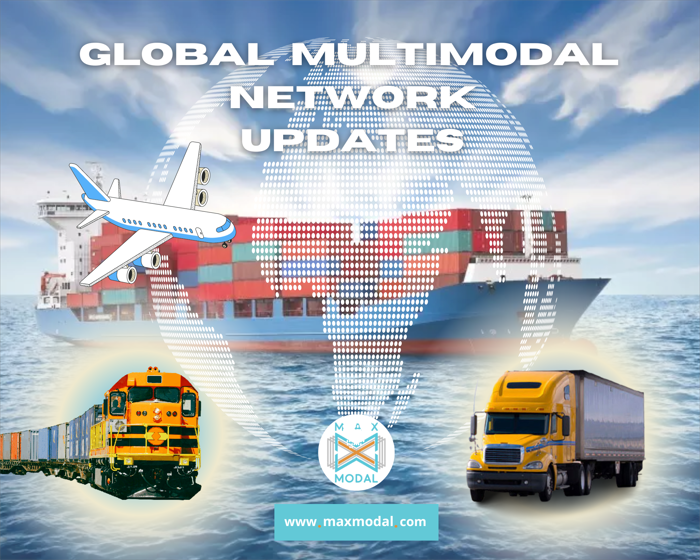The multimodal network news digest - issue #47
The duality of the market
Ocean freight
Trans-Pacific spot rates are reaching a critical level, indicating a significant increase in shipping costs. As the second half of 2023 approaches, there is a possibility of a price war emerging among ocean carriers as they compete to increase their market share in the current economic downturn. However, carriers are observing stable rate levels on most Indian trades, indicating consistent pricing. The Indian market continues showing resilience despite global supply chain challenges and disruptions. Nevertheless, West India-Genoa cargo contract rates for a 20-foot box have moved up to $725, from $700 at the end of May, while for an FEU, rates have dropped to $700, from $800/FEU a month ago.
Overall, the profitability of carriers is severely impacted by the downward spiral of freight rates. Some experts think that companies may need to consider consolidation, capacity adjustments, or other measures to navigate difficult market conditions. For now, carriers have been resorting to aggressive pricing strategies and discounts to attract cargo and maintain market share but this approach is not sustainable in the long-run. Consequently, the charter market is experiencing a decline as carriers opt to off-hire or return ships instead of renewing charter contracts.
The pressure to lower rates is further intensified by the excessive number of new vessels entering the market. Recently an additional 624,000 container newbuild slots have been booked as shipowners and operators are strategically planning for future capacity requirements. It is also reported that MSC is soon to further increase its owned container capacity.
All these new bookings are expected to support the efficient movement of goods and contribute to overall industry resilience. In fact, data shows that schedule reliability has reached its highest level in several years. However, it is attributed to factors such as improved vessel performance and better operational practices rather than the expanded capacity. Digitalization and advanced technologies also play a significant role in achieving higher schedule reliability by enabling better data sharing and real-time tracking. Consequently, shipping lines are reducing the number of blank sailings as they strive to meet growing customer demands and optimize vessel utilization.
Ports
- The Canadian strike that started on July 1 is luckily to affect multiple ports across the country, including Vancouver, Montreal, and Halifax. The strike involves approximately 6,000 workers who are members of the International Longshore and Warehouse Union (ILWU) Canada. Efforts to resolve the labor dispute and avoid the strike are ongoing, but a resolution has not yet been reached.
- A new bill has been introduced to limit the power of unions in response to the recent strikes on the US West Coast. The bill proposes changes to existing labor laws to provide more flexibility in hiring and to discourage strikes. Supporters of the bill argue that excessive union power has contributed to prolonged and costly disruptions. Proponents believe that curbing union influence will enhance the competitiveness and reliability of US ports. However, critics argue that the bill undermines workers' rights and could lead to unfair labor practices.
Rail
- Union Pacific, Norfolk Southern, and CSX are joining forces to establish a new intermodal freight corridor in the US. It will link Mexico, Texas and the US south east as near-shoring drives capacity demand. The project is expected to bring numerous benefits, including reduced congestion, lower emissions, and increased capacity for freight movement.
- From July 1, CMA CGM reviewed peak season surcharges for shipments from the Indian Subcontinent to the US East Coast. The updated surcharge is $150 per 20' dry container and $300 per 40' and 45' dry box.
- Train traffic on the China-Kazakhstan border has seen a significant increase of 14.6% during this year proving the importance of the Belt and Road initiative. The trend of increasing train traffic is likely to continue as both countries seek to strengthen their economic ties and expand trade opportunities.
- Kazakhstan, Azerbaijan, and Georgia have agreed to establish a joint logistics company for transportation on the Trans-Caspian International Transport Route (TITR). It is a part of the New Silk Road initiative. The joint logistics company will focus on streamlining freight transportation processes, including customs procedures, documentation, and infrastructure development.
- Germany is facing the possibility of rail strikes in the autumn, following the disputes between Deutsche Bahn and the trade union GDL. The exact timing and duration of the strikes have not been confirmed. The GDL has expressed its dissatisfaction with the progress of negotiations.
Rotes, rates & services
- CMA CGM has expanded its multimodal capabilities by integrating Containerships that specializes in short-sea shipping and logistics in Europe and the Mediterranean region. The move aligns with CMA CGM's strategy to strengthen its presence in the intra-European market and diversify its offerings.
- CMA CGM has modified its BSMAR (Black Sea Medline) service route. The new rotation is: Constanta – Ambarli – Aliaga – Malta – Valencia – Algeciras – Casablanca – Tanger Med – Malta – Piraeus – Gebze – Constanta
- CMA CGM has rescheduled its Turkey Med Express 1.2 service (TMX1.2) with the new rotation: Izmit – Gebze – Gemlik – Aliaga – Valencia – Barcelona – Marseille – Djen Djen – Annaba – Izmit.
- CMA CGM has revealed plans to overhaul its Euronaf service, which serves West Mediterranean, the Tanger hub, and Algerian ports. The company aims to achieve this by consolidating four loops into two, resulting in a more efficient and streamlined service.
These are only several changes that occurred in more than 250 bn freight rates across 25 million routes with more than 1 million market players. Want to share some news about your company, services, and routes? Just post them on MAXMODAL, a multimodal network that digitally connects routes and rates worldwide to automate sales and operations across container transportation & logistics industry. Join to innovate.

